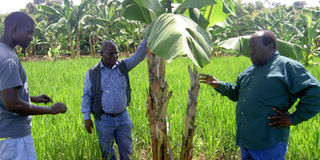Grow rice, bananas together to fight climate change

Prof Moris Ogenga Latigo (R) in a banana garden intercropped with rice. PHOTO BY TOBBIAS JOLLY OWINY.
They say desperate times call for desperate measures and for farmers in northern Uganda grappling with climate change, intercropping rice with bananas has helped a great deal, writes Tobbias Jolly Owiny.
Growing banana in rice fields and vice versa would probably have been dismissed as “unthinkable” by traditional farmers, but farmers who have dared to experiment with it only sing praises.
The government through ministry of agriculture has rallied farmers to embrace conservation farming that is already widely being practiced in some neighbouring countries such as Kenya, Rwanda and Tanzania. They are growing banana, rice and coffee plants on the same soil to prepare for the new climate in the long term, and to grow the economy in the short term.
Experience
Michael Opiyo, a resident of Aputi cell, Kochgoma Sub County, Nwoya District is one of the farmers experimenting with growing rice alongside bananas.
“I have 10 acres of bananas that I have intercropped with both rice and coffee. I do not regret this decision I am just grateful for the training I got from AVSI initiative,” Opiyo says.
He says the training gave him the confidence to try out what no one else in his village had done, setting a rice field in a banana garden. Drip irrigation and fertilisation techniques helped him conserve water up to 50 per cent and get a four-fold increase in income.
In the past, Opiyo grew food crops to feed his family. But after intercropping it with coffee and rice, his income trippled and in the past two years he has been able to manage the water retention in his soil even during the dry season.
Benefits
Last year, he made Shs11m from his rice harvest. His household expenditure also decreased since he had rice to supplement on the family diet. He is looking forward to harvest his coffee by 2018. “I started planting rice and coffee under the bananas in 2015 after an agriculture expert’s advice and a subsequent training on conservation farming, now I am not worried about climate change,” he said.
Expert take
Agricultural experts say new agricultural techniques in the country like this are not just about poverty alleviation - they are a critical component of combating climate change. According to John Bosco Oryema, an agronomist and agribusiness consultant in Nwoya District, intercropping bananas with rice improves the water retention capacity of the soil and it holds the soil base tight not to be washed away by wind or running water.
“Rice will cover the soil surface as mulches even after they are harvested against agents of erosion and retain water in the soil since bananas need much water and at the end the yields are good,” Oryema said.
Hiccups
Richard Ogenrwot, a trained farmer on the outskirts of Gulu Town who has intercropped his bananas with coffee and rice together said farmers whom he sold the idea to were not willing to try it saying it did not make sense since there is yet a lot of open and virgin land.
However, Oryema says rigidity in farmers is setting a low pace for campaign for climate-smart farming.
Recently, Prof Moris Ogenga Latigo, an agricultural scientist, said many farmers did not know that bananas and rice can perform so well combined and it is one practice that farmers should adopt.
“It is climate smart to do them together, rice does not sink its roots so deep to survive so it gives bananas time to pull enough nutrients and it keeps the soil texture and composition in its original form,” Prof Ogenga said.
Intercropping or mixed cropping farms is a cropping practice where total production from a unit area of land in a farming year is achieved through growing two or more crops simultaneously in the same land area.




